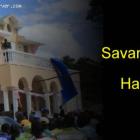ADVERTISEMENT
Joseph Davilmar Theodore - Haiti Observer Blog
Joseph Davilmar Theodore, Haiti Observer Blog. Read the following articles about Joseph Davilmar Theodore
Rene Theodore, head of Haitian Communist Party
Rene Theodore died of lung cancer in June, 2003 because of lung cancer. He was the former head of the Haitian Communist Party. He was receiving treatment in Miami's Jackson Memorial Hospital. His death was confirmed by Max Bourjolly who was second in command of the Haitian Communist Party. Rene Theodore entered politics when he was in High School and then continued his political life for 47 years. His last political act was in 2002 December when he co-signed a declaration from the opposition which called for resignation of the then President Jean-Bertrand Aristide.
Brief Political Career of Rosalvo Bobo
Rosalvo Bobo became a Haitian revolutionary and government official as America and Europe entered World War I. Although educated as a physician and attorney, his strong political views and dominant personality led him to seek power in Haitian politics.
In 1914, Haiti had been a free republic for a decade, having won its independence from France. But it had not been successful as a stable government, having witnessed a turnover of three presidents in less than two years.
Near the end of 1914, Rosalvo Bobo led a military invasion on a prison holding detainees, which failed, forcing him to find sanctuary at the German embassy. After five days secreted, Bobo reappeared, announcing he was leading a rebellion to unseat President Oreste Zamor from office. He was successful and Davilmar Theodore came into power. Theodore named Bobo Secretary of State of the Interior and Commander of the Haitian police. However, both Rosalvo Bobo and Theodore's time in power was cut short.
Brief Political Career of Rosalvo Bobo
Rosalvo Bobo became a Haitian revolutionary and government official as America and Europe entered World War I. Although educated as a physician and attorney, his strong political views and dominant personality led him to seek power in Haitian politics.
In 1914, Haiti had been a free republic for a decade, having won its independence from France. But it had not been successful as a stable government, having witnessed a turnover of three presidents in less than two years.
Near the end of 1914, Rosalvo Bobo led a military invasion on a prison holding detainees, which failed, forcing him to find sanctuary at the German embassy. After five days secreted, Bobo reappeared, announcing he was leading a rebellion to unseat President Oreste Zamor from office. He was successful and Davilmar Theodore came into power. Theodore named Bobo Secretary of State of the Interior and Commander of the Haitian police. However, both Bobo and Theodore's time in power was cut short.
Role, Term of Haitian Presidents from Haiti Independence to 2013
The Haitian government is led by a president, who shares his/her executive power with the prime minister. Once elected by popular vote, the president will run the country for five years. After the term, the president could not run in the next election. He/she has to wait for five years in order to seek a second term. Haiti presidents can only serve for a maximum of two terms.
Not everyone can run for president as there are certain qualifications and requirements to be eligible for the seat. Only candidates with Haitian citizenship by birth can run for the position, as well as those who are at least 35 years of age. Jail sentence, loss of civil rights and lack of property ownership and residency can make a candidate ineligible to assume the position.
Haitian Leader Joseph Davilmar Theodore
Joseph Davilmar Theodore was born in 1847 in Ennery, which is in the district of Gonaives and the Artibonite department. He served in military of Haiti. He was against the leadership of Oreste Zamor. Therefore he organized with cacao farmers to rebel against President Oreste Zamor.
He succeeded in overthrowing president Zamor and he took over as the president on November 7, 1914. He took the oath on November 10, 1914. He convinced the U.S government to offer money to his government in exchange for custom control, railway and banks.
When he became president, he failed to pay the cocoa farmers as he had promised them. The cocoa farmers rebelled against him forcing him to resign on 22 February 1915. He was succeeded by Jean Vilbrun Guillaume Sam. He went to banish in Curacao but he later returned to Haiti under American protectorate.
Our objective is to share with you news and information about Haiti and the people of Haiti. Traditions, habits and the way we were or grew are alive in this site. We highly recommend that you Subscribe to our Newsletter and also share with us some of the things that are memorable and made us unique people.

 Haitian Thanksgiving
Haitian Thanksgiving  Newsletter
Newsletter  The Town of Savanette, Haiti
The Town of Savanette, Haiti  Thomonde, Haiti
Thomonde, Haiti  Something to think about
Something to think about